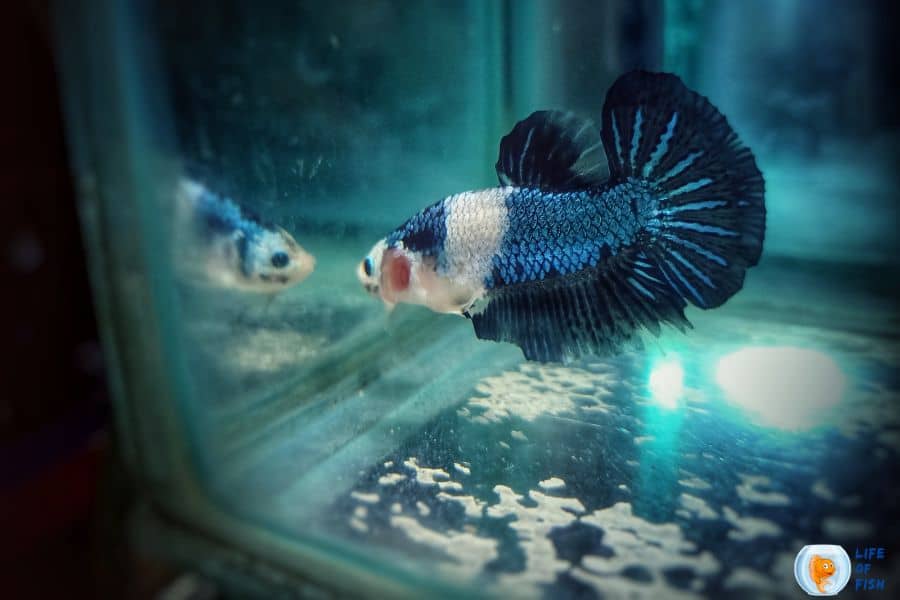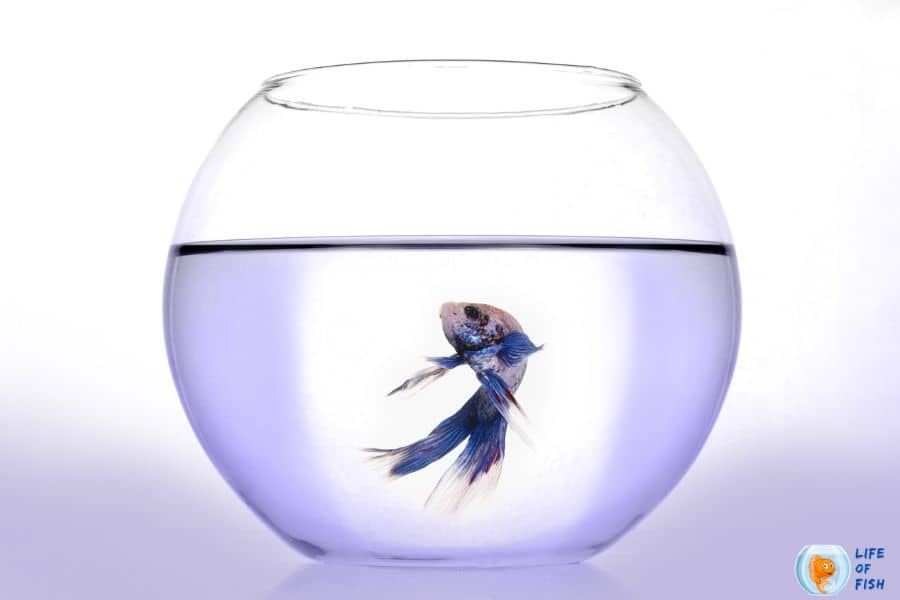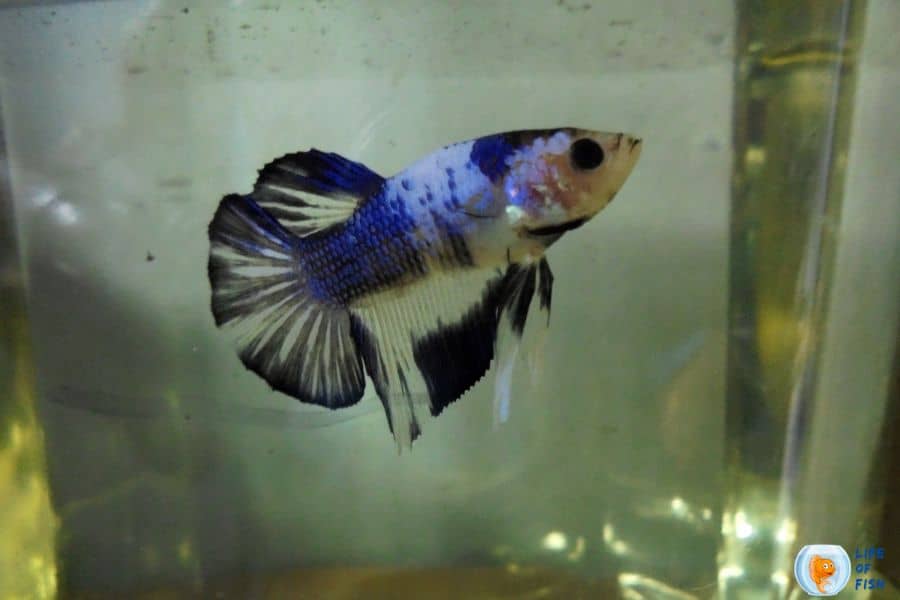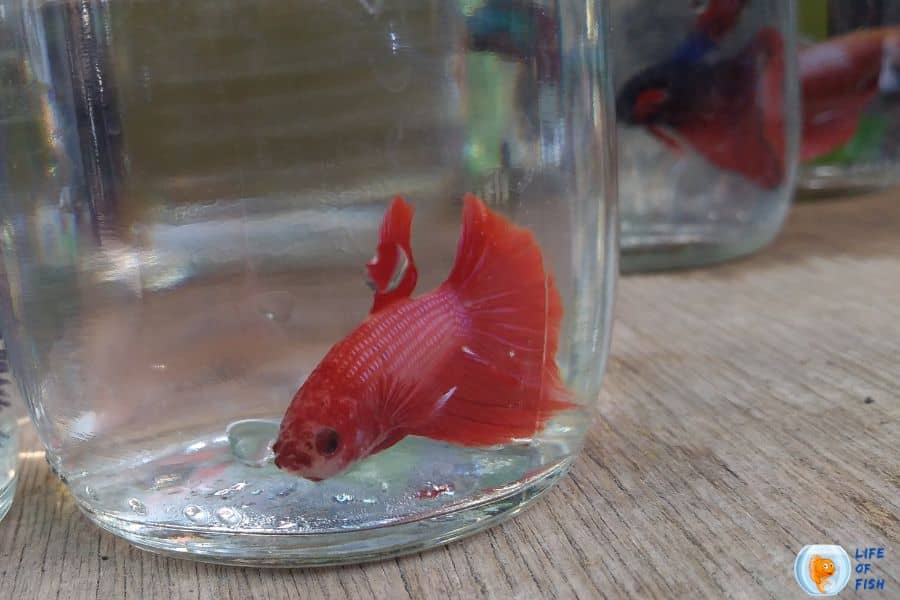Bettas a meant to live alone in aquariums because they are super duper aggressive. Yet, some aquarists successfully keep them with other fish species.
Lucky for them, their bettas get along well with their tank mates. This is because their aggression is only targeted at other bettas of the same sex and other similar-looking fish.

If you are one such aquarium owner that has a betta in a community tank, then you need a hospital tank for betta. This is because when your betta falls sick, he needs to be isolated from the other fish so that his illness does not spread. In addition, hospital tanks for betta help in the quick and easy treatment of your fish.
This article will help you through the process of setting up a hospital tank for your betta.
“Interested in learning more about Betta Fish Diseases? Check out our comprehensive guide to identifying and treating common Betta illnesses here!” Betta Fish Diseases
What is a Hospital Tank?
Jump To
- 1 What is a Hospital Tank?
- 2 Why Should You Use A Hospital Tank For Betta?
- 3 How Long Should A Fish Stay In A Hospital Tank?
- 4 How To Set Up A Hospital Tank For Betta
- 5 What Should You Do After Your Betta Has Recovered?
- 6 How Do You Clean A Quarantine Fish Tank?
- 7 What If Your Betta Dies In The Hospital Tank?
- 8 Related quesions
- 9 Conclusion
A hospital tank is a separate aquarium where you can keep your betta fish when he falls ill.
The hospital tank is meant to isolate your betta so that his illness does not spread to the other fish in the community tank. In addition, hospital tanks help in the quick and easy treatment of your fish.
Although a hospital tank is meant to keep sick fish, you can also quarantine new fish in it for a few weeks to make sure that they are not carrying any diseases.
You should quarantine any new fish regardless of where you got them from. This is because fish in the wild can be carriers of diseases that can infect your other fish.
You should also set up a hospital tank before getting your first fish. This is because you never know when you might need it. It will always be better to be prepared rather than caught off guard.
Why Should You Use A Hospital Tank For Betta?
As we mentioned at first, bettas are meant to be alone. This is because they are super aggressive and prefer to live alone in the wild.
When your betta falls sick, the fish around it bothers him and worsens his condition. This is why it is essential to have a hospital tank set up for your betta so that you can isolate him when he falls ill.
In addition, hospital tanks help in the quick and easy treatment of your fish. This is because you can easily add medication to the water without worrying about harming the other fish in the tank.
How Long Should A Fish Stay In A Hospital Tank?
Your opinion may vary depending on the health of your fish. If your fish is severely ill, then he may need to stay in the hospital tank for a few weeks.
However, if your fish is only mildly sick, then he may only need to stay in the hospital tank for two weeks or less.
You will need to use your best judgment to determine how long your fish should stay in the hospital tank.
If you are not sure, it is always best to err on the side of caution and keep your fish in the hospital tank for a more extended period of time.

How To Set Up A Hospital Tank For Betta
Setting up a hospital tank for your betta is a fairly simple process. You will need to purchase some things like a small aquarium, an air pump, and an air stone. Below we have listed what you need to set up a hospital tank.
Equipment Needed
A tank or a container
If you can buy a small aquarium, that would be better. If you can’t afford one or don’t have the space, any kind of container will do. Just make sure that it is big enough for your betta to move around comfortably and that it has a lid.
An air pump
The air pump is necessary to keep the water oxygenated. Make sure to get a quiet air pump so that it does not disturb your betta.
An air stone
The air stone is necessary to diffuse the air coming from the air pump. This will help to create a more oxygenated environment for your betta.
A filter
The filter is not necessary, but it is recommended. This is because the filter will help to keep the water clean and will also help to aerate the water. However, you shouldn’t use filters with Activated Carbon as it will remove the medication from the water.
Further, biological filters are no use as the medications used in the hospital tank will kill the beneficial bacteria in the filter.
The best type of aquarium filter for a betta hospital tank is a sponge filter.
A heater
The heater is not necessary, but it is recommended. This is because bettas are tropical fish and prefer warm water. Further, you may sometimes have to provide a warmer temperature, depending on the climate and illness.
Water conditioner
The water conditioner is necessary to remove any harmful chemicals from the water. This is especially important if you are using tap water.
Medication
The medication is necessary to treat your betta’s illness. You will need to consult a veterinarian to determine the best course of treatment for your betta.
Things To Keep In Mind
Before setting up the tank, there are things you should keep in your mind. These are;
Keep The Hospital Tank Away From The Main Tank
Since you are going to carry a sick fish in the hospital tank, you should keep it as far as you can from the main tank.
This is because you don’t want the other fish in the main tank to catch the illness. Some diseases are known to spread through air and water. So, if your hospital tank is near the main tank, the pathogens can spread to the main tank.
Anywhere near 3 feet is considered the “splash zone” as fish can easily splash water out of the tank and onto the floor and the main tank, so try to keep it further away if you can.
Make Sure The Tank Is sterile.
Before setting up the tank, you must ensure it is sterile. This is because you don’t want your betta to catch any other illnesses from the tank. The best method to do this is to sterilize the tank with boiling water.
You can also use a bleach solution to sterilize the tank. To do this, you can mix 1 part bleach with 20 parts water.
Then you will need to soak all of the equipment in the solution for at least 15 minutes. After that, you will need to rinse everything off with clean water. Then you will have to keep it aside for at least 6 hours before filling it up with water again.
Add Treated Water
Since you will treat your betta for an illness, you should ensure the water in the hospital tank is clean without any harmful chemicals like chlorine. The best way to do it is to use treated water.
You either can use bottled water, or you can treat the water yourself. To do this, you will need to add a water conditioner to the tank. This will remove all of the harmful chemicals from the water and make it safe for your betta.
Fill The Tank Halfway
You should only fill the tank halfway with water. This is because bettas are known to jump out of the tank when they are sick. So, if you fill the tank all the way to the top, your betta may jump out and hurt itself.
Check Water Quality Before Adding Your Sick Fish
After adding treated water and setting the tank up, you should test the water to make sure it is safe for your betta. The best way to do it is to use a water test kit. This will test the water for any harmful chemicals.
If everything is fine, then go ahead and add your sick betta to the tank.
Plants And Decorations Help
Although many aquarists recommend hospital tanks without plants and decorations, we recommend keeping some of them for the sake of your betta.
Bettas are usually shy fish, and they feel more comfortable when they have something to hide behind.
Java ferns and anubias are good plants for bettas as they don’t need special care and can survive in low-light conditions.
You can also use plastic plants as they are easier to clean.

Setting up the hospital tank
You can set up the hospital tank as you would do for a regular betta tank. The only difference is that you don’t need to add a filter to the tank, as bettas don’t do well in fast-flowing water. To create aeration for the tank, you can use either an air stone or a bubbler.
Adding substrate is not recommended as it is difficult to clean. If you want to use substrate, then make sure you use something that won’t affect the pH of the water.
Heating The Tank
The ideal temperature for a hospital tank is between 76 and 82 degrees Fahrenheit. You can use an aquarium heater to maintain the temperature of the tank.
Preferred water conditions
The preferred water conditions for a hospital tank are:
- pH level: 7.0
- Water hardness: Soft to medium
- Ammonia level: 0 ppm
- Nitrite level: 0 ppm
- Nitrate level: 0 ppm
- Temperature: 76-85 degrees Fahrenheit
- Water hardness: Soft to medium
What Should You Do After Your Betta Has Recovered?
After your betta has recovered, you should move it back to the main tank. But before doing that, you need to ensure that the water in the main tank is the same as in the hospital tank. This is because if there is a difference in water quality, your betta may get sick again.
Before reintroducing your betta to the main tank, perform a partial water change in the hospital tank. This is because the hospital tank may have high levels of nitrates due to all the medication you added to the water.
Doing a partial water change will help to remove some of the nitrates from the water and make it safe for your betta.
How Do You Clean A Quarantine Fish Tank?
Once you have moved your recovered betta back to the main tank, you need to clean the hospital tank. The best way to do this is to do a complete water change and then disinfect the tank.
To disinfect the tank, you can use a bleach solution. To make the bleach solution, you must add one tablespoon of bleach per gallon of water.
Soak all of the tank accessories in the solution for 15 minutes. After that, thoroughly rinse everything with clean water.
You can then set the tank up again and add new water. Before introducing any fish to the tank, test the water.
What If Your Betta Dies In The Hospital Tank?
Sometimes, things don’t go as planned, and your betta may die in the hospital tank. If this happens, you must remove the body from the tank as soon as possible.
You should then do a complete water change and disinfect the tank. After that, you can set the tank up again and add new fish.

Related quesions
What Size Should A Hospital Tank Be?
The ideal size for a hospital tank is 10 gallons. But you can use a smaller tank or any container if you don’t have a 10-gallon tank. We have seen some hospital tanks as small as 1 gallon, and the fish seems fine with even that tiny size.
But, the main thing is that you should regularly replace the water if you keep the betta in a small tank. If you keep your fish in clean water conditions and if your fish has enough space to explore, then the size of the tank won’t matter that much.
Does A Hospital Tank Need A Filter?
No, a hospital tank doesn’t need a filter. This is because bettas don’t do well in fast-flowing water. Further, the filter can destroy the medications used to treat the betta.
Can I Use Tap Water In A Hospital Tank?
Yes, you can use tap water in a hospital tank. But we recommend using a water conditioner to remove the chlorine from the water. This is because chlorine can harm your betta and destroy the medications used to treat your fish.
Do Quarantine Tanks Need To Cycle?
No, quarantine tanks don’t need to cycle. This is because you will be regularly changing the water in the tank. So, there is no need to cycle the tank.
How Often Should I Change The Water In A Hospital Tank?
You should change the water in a hospital tank every day. This is because the medications used to treat your betta can harm your fish if they build up in the water.
Conclusion
A hospital tank for a betta is a great way to keep your betta safe and healthy. It is also an excellent approach to keeping disease at bay in your fish tank. We hope this post has helped you understand the significance of a hospital tank and how to set up one.
Read Next : Betta Lice 101: Everything You Need to Know
Read Next: Betta Fin Rot vs Fin Loss vs fin melt- comparison
